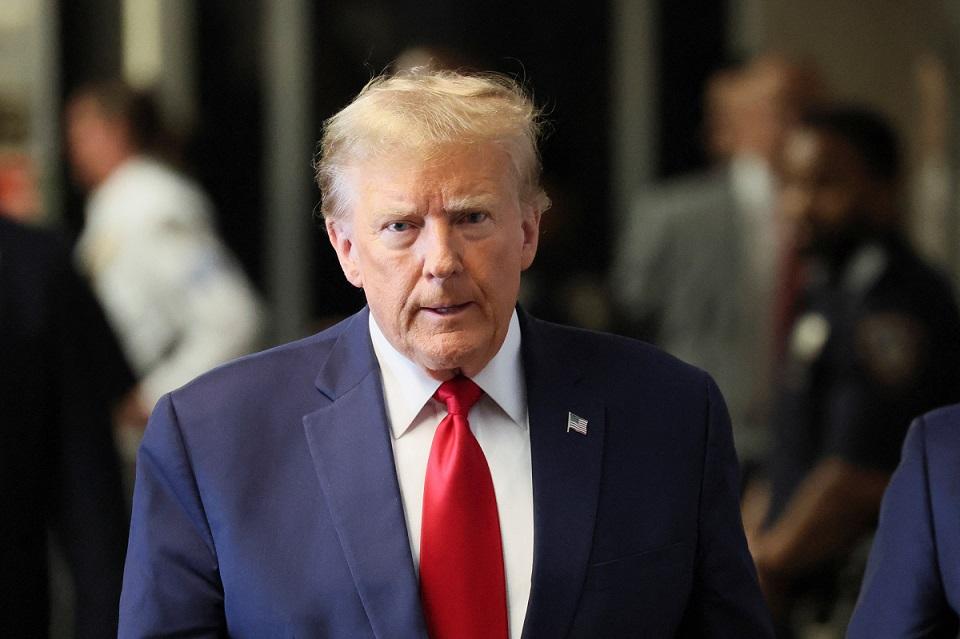Trump to stand trial on March 25 in NY hush money case, judge rules

NEW YORK — A New York judge on Thursday denied Donald Trump's request to dismiss criminal charges stemming from hush money paid to a porn star, paving the way for the first-ever criminal trial of a former US president.
Justice Juan Merchan set a trial date of March 25 for the case, one of four criminal prosecutions Trump faces as he pursues the Republican nomination to challenge Democratic President Joe Biden in the Nov. 5 US election.
Trump, 77, had asked Merchan to toss the 34-count indictment, which charges him with falsifying business records to cover up the $130,000 payment to porn star Stormy Daniels before the 2016 election.
But Merchan took less than 10 minutes to deny his request and confirm the March 25 start date.
Ahead of the hearing, Trump repeated his claims that the case is politically motivated.
"They wouldn't have brought this except for the fact—no way—except for the fact that I'm running for president and doing well," Trump said in a hallway outside the courtroom.
The trial is set to start before the three other criminal cases Trump faces.
Trump may have effectively wrapped up the Republican nomination by that point. He has won the first four state nominating contests and opinion polls show him with a wide lead over his lone challenger, Nikki Haley.
Trump has used his frequent court dates to help raise money for his presidential campaign, though the strategy is seeing diminishing returns after he raked in millions around his first appearances last year.
Trump has pleaded not guilty to the charges brought by Manhattan District Attorney Alvin Bragg, a Democrat.
A handful of protesters held signs denouncing Trump and shouted "no dictators in the USA" outside the courthouse.
Trump's political and legal calendars are increasingly overlapping ahead of his expected rematch with Biden, who defeated him in the 2020 election.
In a separate court hearing on Thursday, Trump's lawyers will ask a Georgia judge to disqualify the prosecutor who charged him and several allies with crimes involving trying to overturn his 2020 election loss in the state. The prosecutor, Fani Willis, has admitted to having a romantic relationship with a lawyer on her team.
Trump also faces federal charges in Washington over his efforts to overturn his election loss and in Florida over his handling of classified documents. Trump has pleaded not guilty in all the cases.
In a testy exchange, Trump's lawyer Todd Blanche pressed Merchan to reconsider his decision to hold the trial on March 25, citing scheduling issues with the other cases.
"It is completely election interference to say that you are going to sit in this courtroom in Manhattan when there's no reason for it," Blanche said.
"He's not going to be at more than one criminal trial at the same time," Merchan said. "Stop interrupting me, please."
The Manhattan case centers on former Trump lawyer Michael Cohen's $130,000 payment to Daniels— whose real name is Stephanie Clifford—to prevent her from publicly speaking ahead of the 2016 election about a sexual encounter she has said she had with Trump a decade earlier. Trump has denied this occurred.
Cohen pleaded guilty in 2018 to violating federal campaign finance laws.
Prosecutors have said Trump's New York-based family real estate company recorded Trump's 2017 reimbursements to Cohen as legal expenses, violating a state law against falsifying business records to conceal another crime.
In this case, prosecutors say Trump was seeking to cover up federal campaign-finance law violations as well as violations of a state law that prohibits promoting a candidacy by unlawful means.
Trump's lawyers argue that he had been targeted for "selective prosecution." Bragg's office says anyone else who behaved similarly would have been prosecuted, pointing to Cohen's guilty plea.
Trump's lawyers also argued state prosecutors cannot use Trump's alleged concealment of federal election law violations to justify the false records charges, and that the state law does not apply to federal elections.
Bragg's office has said the business records falsification law was not restricted to cases involving state-level crimes, and that the state law applies to both federal and state elections. — Reuters




